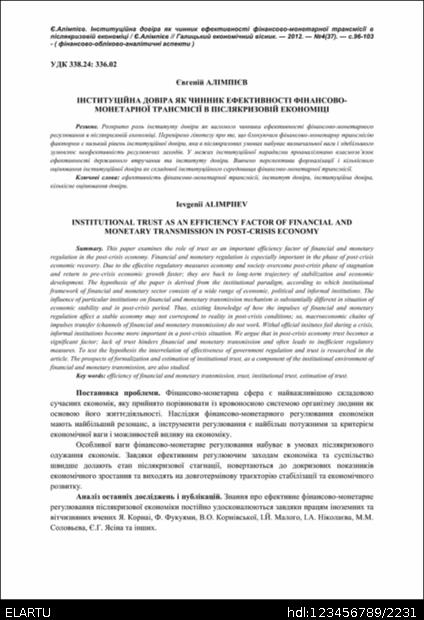Будь ласка, використовуйте цей ідентифікатор, щоб цитувати або посилатися на цей матеріал:
http://elartu.tntu.edu.ua/handle/123456789/2231

| Назва: | Інституційна довіра як чинник ефективності фінансово-монетарної трансмісії в післякризовій економіці |
| Інші назви: | Institutional trust as an efficiency factor of financial and monetary transmission in post-crisis economy |
| Автори: | Алімпієв, Євгеній Alimpiiev, Ievgenii |
| Бібліографічний опис: | Є.Алімпієв. Інституційна довіра як чинник ефективності фінансово-монетарної трансмісії в післякризовій економіці / Є.Алімпієв // Галицький економічний вісник. — 2012. — №4(37). — с.96-103 - ( фінансово-обліково-аналітичні аспекти ) |
| Дата публікації: | 2012 |
| Дата внесення: | 27-тра-2013 |
| Видавництво: | Тернопільський національний технічний університет ім. Івана Пулюя |
| Місце видання, проведення: | Тернопіль, Україна |
| УДК: | 338.24 336.02 |
| Теми: | ефективність фінансово-монетарної трансмісії інститут довіри інституційна довіра кількісне оцінювання довіри efficiency of financial and monetary transmission trust institutional trust estimation of trust |
| Короткий огляд (реферат): | Розкрито роль інституту довіри як вагомого чинника ефективності фінансово-монетарного регулювання в післякризовій економіці. Перевірено гіпотезу про те, що блокуючим фінансово-монетарну трансмісію фактором є низький рівень інституційної довіри, яка в післякризових умовах набуває визначальної ваги і здебільшого зумовлює неефективність регулюючих заходів. У межах інституційної парадигми проаналізовано взаємозв’язок ефективності державного втручання та інституту довіри. Вивчено перспективи формалізації і кількісного оцінювання інституційної довіри як складової інституційного середовища фінансово-монетарної трансмісії. This paper examines the role of trust as an important efficiency factor of financial and monetary regulation in the post-crisis economy. Financial and monetary regulation is especially important in the phase of post-crisis economic recovery. Due to the effective regulatory measures economy and society overcome post-crisis phase of stagnation and return to pre-crisis economic growth faster; they are back to long-term trajectory of stabilization and economic development. The hypothesis of the paper is derived from the institutional paradigm, according to which institutional framework of financial and monetary sector consists of a wide range of economic, political and informal institutions. The influence of particular institutions on financial and monetary transmission mechanism is substantially different in situation of economic stability and in post-crisis period. Thus, existing knowledge of how the impulses of financial and monetary regulation affect a stable economy may not correspond to reality in post-crisis conditions; so, macroeconomic chains of impulses transfer (channels of financial and monetary transmission) do not work. Withal official insitutes fail during a crisis, informal institutions become more important in a post-crisis situation. We argue that in post-crisis economy trust becomes a significant factor; lack of trust hinders financial and monetary transmission and often leads to inefficient regulatory measures. To test the hypothesis the interrelation of effectiveness of government regulation and trust is researched in the article. The prospects of formalization and estimation of institutional trust, as a component of the institutional environment of financial and monetary transmission, are also studied. |
| URI (Уніфікований ідентифікатор ресурсу): | http://elartu.tntu.edu.ua/handle/123456789/2231 |
| Власник авторського права: | © „Галицький економічний вісник“ |
| Статус публікації : | Опубліковано раніше |
| Тип вмісту: | Article |
| Розташовується у зібраннях: | Галицький економічний вісник, 2012, № 4 (37) |
Файли цього матеріалу:
Усі матеріали в архіві електронних ресурсів захищені авторським правом, всі права збережені.